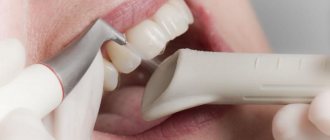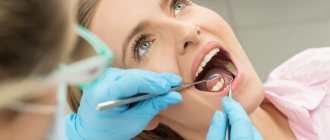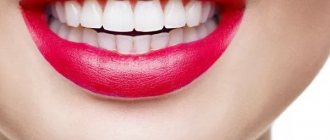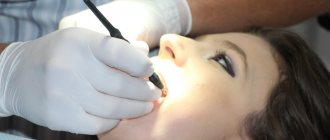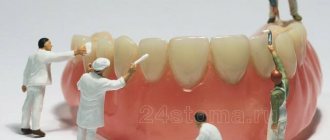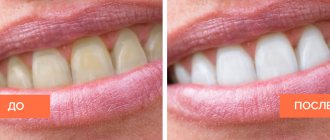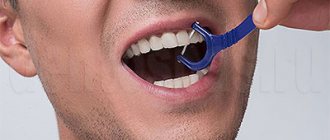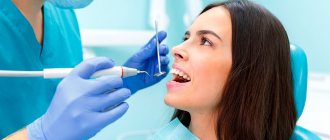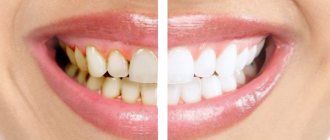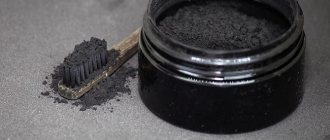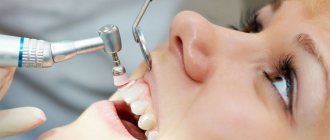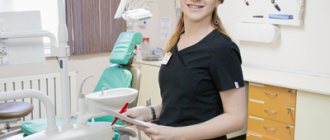- Hygienic teeth cleaning
- When is the best time to have your teeth professionally cleaned?
- Comprehensive professional teeth cleaning
- Professional teeth cleaning with ultrasound
- Cleaning teeth from plaque using the Air Flow method
- What is laser teeth cleaning?
- Manual teeth cleaning how the procedure is done
- Preventative care after comprehensive cleaning
- How and what to brush your teeth at home
- Our doctors
Plaque forms in the mouth due to harmful bacteria. If you do not take the necessary measures, this provokes the formation of tartar and the development of caries. Gum pathology may develop, leading to loosening and then tooth loss. To take care of their hygiene and health, professional hygienic teeth cleaning is necessary. To do this, it is worth visiting a dental clinic in Moscow.
The procedure effectively removes plaque, returns teeth to their natural white color, and prevents caries and gum disease. Professional care differs from home care in that the dental hygienist works with special tools. Plaque removal can be done in hard-to-reach places that a regular brush or even expensive toothpaste cannot do. The enamel layer is lightened by 1-2 tones, acquires a white color and a healthy appearance.
Deep hygienic dental cleaning prevents periodontal disease, damage to teeth by caries, their mobility, and loss.
When is the best time to have your teeth professionally cleaned?
You can tell when it’s time to see a doctor based on the following signs:
- an unpleasant putrid odor appeared from the mouth;
- the gums began to bleed, their subsidence was noticeable;
- itching or burning appears, pain is possible, especially when chewing food;
- tartar is visible visually;
- the color of the periodontium has changed.
Professional teeth cleaning will not harm your health, but there are contraindications:
- diseases of stomatitis, hepatitis, tuberculosis, as well as the presence of acute infections;
- the patient’s tooth enamel is too thin;
- intolerance to components used in cleaning;
- erosion, hypoplasia of tooth enamel.
Dental hygiene should not be done if the patient is under the age of eighteen. Professional hygiene is also contraindicated for HIV-infected people and AIDS patients. If there are diseases associated with difficulty breathing (asthma, epilepsy), sandblasting should not be carried out.
Professional oral hygiene during pregnancy and children
It is believed that the procedure of brushing teeth by a hygienist is not recommended for pregnant women, but there are some nuances here. Most contraindications are associated with ultrasound, which, according to some experts, can affect the mother's metabolic process and the development of the fetus. On the other hand, a healthy oral cavity has a beneficial effect on the entire body. Professional cleaning may be recommended during pregnancy, given the fact that at this time teeth become especially vulnerable to bacteria. During pregnancy, the gentle Air Flow technique is most often used, which does not involve exposure to ultrasound.
Oral hygiene in children also has its own characteristics. Ultrasonic cleaning is not recommended for children under 15 years of age, as ultrasound can damage fragile tooth enamel and disrupt tooth growth. At the same time, you cannot completely refuse to brush your teeth in the clinic: in childhood, professional hygiene is especially important, since it lays the foundations of dental culture and affects the quality of life of an adult.
Comprehensive professional teeth cleaning
The hygienic procedure is carried out using various professional methods. In a dental clinic in Moscow, the professional technique is individual for everyone. Regardless of the choice, the procedure is carried out in several stages:
- The dentist examines the patient's oral cavity. Based on the examination, a treatment plan is drawn up. If teeth cleaning is needed, the types and methods are determined by the hygienist.
- Chemical cleaning and removal of soft plaque with a professional toothbrush is performed.
- Removing hard plaque depends on the professional method chosen.
- The dentist uses dental strips to clean the sides of the teeth and polish them.
- The enamel is polished on all sides, all irregularities are eliminated. For this purpose, dentistry uses special brushes and professional cleansers.
- Deep cleaning of teeth is completed by applying a solution containing fluoride to the surface. The composition is applied briefly. Professional fluoridation strengthens the enamel, since it is weakened by the action of tartar. Teeth should be fluoridated to reduce their sensitivity and to prevent caries. Fluoridation can be done as a separate procedure.
After the hygiene procedure, the dentist gives the patient recommendations for professional oral care. This allows the effect to last longer.
Indications and contraindications
Teeth cleaning in a dental clinic is recommended for everyone, but those people who:
- have installed permanent dental structures (braces, veneers, crowns, implants, etc.);
- are going to undergo professional teeth whitening;
- planning prosthetics or dental treatment;
- smoke;
- drink a lot of drinks that have a coloring effect (coffee, tea, etc.).
If there are certain health problems, a person cannot use any of the teeth cleaning methods offered by dentists, but if necessary, you can choose another option. For example, temporary contraindications include:
- inflammation of the oral mucosa;
- ARVI, bronchitis or other diseases that make nasal breathing difficult;
- pregnancy and breastfeeding period.
In such cases, professional teeth cleaning can be done after such reasons have ended.
General contraindications include the following health problems:
- arrhythmia and other heart diseases;
- asthma;
- increased sensitivity of teeth;
- allergic reactions;
- tuberculosis;
- hepatitis;
- various infectious diseases;
- epilepsy, etc.
Such manipulations are not performed on children and adolescents; if necessary, stone cleaning can be carried out if permanent teeth are present (over the age of 12 years).
Professional teeth cleaning with ultrasound
If you influence tartar with ultrasonic waves, the process of getting rid of it becomes quick. The advantage of the ultrasound method is its antimicrobial and antibacterial effects.
Ultrasound is safe. Professional attachments are put on the emitter. They effectively remove plaque even in hard-to-reach areas. The result is exfoliation of tartar and its partial destruction. This is relevant when removing it from gum pockets - their treatment with an instrument can be painful and traumatic.
Thanks to ultrasound, such professional teeth cleaning guarantees a gentle effect on tooth enamel.
The hygienic procedure begins with exposure to an ultrasonic scaler at an angle. High frequency vibrations of ultrasonic waves remove deposits from the surface. At the same time, a flow of liquid is supplied. Together with ultrasonic vibrations, plaque and stone remains are washed away from periodontal pockets and interdental space. Hard tissues are lightened.
One session is enough to remove hard and soft deposits. Ultrasound teeth cleaning has almost no disadvantages. Exceptions to the effects of ultrasound - several contraindications:
- the presence of a pacemaker, severe cardiovascular disease or acute renal and hepatic failure in the patient;
- significant demineralization of tooth enamel;
- Ultrasonic teeth cleaning is prohibited if there is caries, which manifests itself in the form of multiple destructions;
- purulent diseases of the oral mucosa;
- the presence of orthopedic structures, especially metal ones.
Ultrasonic teeth cleaning has advantages:
- the versatility of the method, which allows ultrasound to remove deposits even in hard-to-reach places;
- antibacterial effect;
- no discomfort or pain during professional cleaning.
Carrying out professional oral hygiene
- Primary cleaning of soft plaque using abrasive paste.
- Removing deposits using an ultrasonic scaler, laser or Air Flow method.
- Polishing the surface of the teeth with special brushes and strips (interdental strips) with an applied abrasive substance.
- Remineralization of enamel and application of whitening compounds. This is an additional item of professional cleaning, which is agreed upon with the patient in advance and, as a rule, is paid separately.
Cleaning teeth from plaque using the Air Flow method
Unlike the ultrasonic method, Air Flow is the effect of air flow together with an abrasive on hard plaque. The abrasive material is soda, which is applied along with a thin stream of water. Adding menthol or lemon flavors to water gives a refreshing effect. Small particles of soda hitting the enamel due to the air flow do not harm the teeth. They effectively cope with soft and hard plaque in gum pockets and interdental spaces.
Brushing your teeth with water reduces the heating of enamel during the hygiene procedure. This professional method helps in effectively removing plaque and tartar, and thoroughly polishes the enamel.
In addition to being used as a comprehensive approach, air brushing is suitable in the following cases:
- implants, crowns, and other orthodontic structures are installed in the mouth, as well as if braces or implantation are to be removed;
- problems with gums at the initial stage or there is plaque that has not yet turned into tartar;
- severe pigmentation of teeth due to smoking, coffee abuse and foods with dyes.
The professional Air Flow technique is safe and painless, has a gentle effect, and cannot cause an allergic reaction.
If preventive teeth cleaning is not carried out as part of a comprehensive procedure, the effect will be short-lived. For a more lasting result, it should be done about four times a year.
Types and differences
Professional teeth cleaning can be done in a variety of ways. Each of them has both advantages and disadvantages. The patient’s wishes are taken into account when choosing a technique, but the final decision is made by the doctor, taking into account contraindications and the condition of the teeth.
Ultrasonic
The most effective way to remove solid deposits is ultrasonic cleaning. With its help, tartar is removed. A special device is used for this: it can be built into the dental unit or made as a separate unit. This is an ultrasonic scaler.
There is a working nozzle at the tip of the device. Its tip makes oscillatory movements at an ultrasonic frequency of 25-50 kHz. Additionally, water or an antiseptic solution is supplied to the nozzle. They enhance the cleansing effect due to cavitation - vibrations of water dipoles with the formation of bubbles. Excess fluid is removed using a saliva ejector.
Ultrasonic cleaning, when carried out correctly, does not damage the enamel. It allows you to remove not only tartar, but also bacteria due to the supply of an antiseptic solution and the bactericidal effect of cavitation. Supra- and subgingival deposits are also removed. The procedure is absolutely painless and comfortable.
Laser teeth cleaning
Teeth cleaning with a laser is quick. The beam is directed onto the surface of the teeth, causing the water in the plaque to evaporate. Residues are washed off with a water jet under pressure.
Teeth cleaning with a laser requires expensive equipment. It is significantly higher in price than the others.
Sandblasting
Teeth cleaning by sandblasting is carried out using an Air Flow device. This is a modern and effective way to remove old plaque. For cleaning you need a device with attachments, a mixture of fine abrasive and a fixing gel. Cleansing powders are produced with pleasant flavors, which makes the procedure more comfortable.
Hygiene with Air Flow is not suitable for removing tartar. But the device copes well with old soft plaque. It does not harm enamel, but should be used with caution in people with sensitive gums.
What is laser teeth cleaning?
Laser therapy is based on the evaporation of liquid from plaque and deposits with a laser, after which the stones are destroyed layer by layer.
Hygienic laser cleaning does not involve contact of instruments with oral tissues. The professional technique is completely painless and has an antiseptic effect. The likelihood of an infection being introduced is zero.
Laser cleaning of teeth from stone gives the enamel a white color. Professional work effectively helps fight pathogenic bacteria and promotes wound regeneration. Prevention of caries is an additional advantage of the procedure. Contraindications to it are severe infectious and viral infections, asthma, epilepsy, as well as the presence of implants, orthopedic structures, and pacemakers in the patient.
A lasting effect will be ensured by teeth cleaning and fluoridation.
Manual teeth cleaning how the procedure is done
Dentists use the manual method as the last stage of a comprehensive hygiene procedure. It helps to manually remove the remains of tartar and plaque in places that are difficult to treat with dental instruments using ultrasound or laser techniques.
Manual hygienic cleaning of teeth is done using strips, curettes or dental floss. These instruments help the dentist eliminate mechanical and hardware processing errors in the space between teeth.
The use of polishing pastes enhances the effect.
HOME WHITENING
| Making a custom mouth guard for one jaw | 5,000 rub. |
| Day White 6 syringes (use on individual mouth guards 2 times a day for 15-30 minutes) | 9,000 rub. |
| Night White 6 syringes (use on individual aligners for the whole night) | 9,000 rub. |
| Opalescence 1 syringe | 2,000 rub. |
| Opalescence 4 syringes | 4,000 rub. |
| Opalescence 8 syringes | RUB 5,200 |
| Tres White (set of 10 upper and 10 lower aligners) | 9,000 rub. |
| When ordering aligners at the Symmetry clinic, you will receive a 10% discount on the purchase of home whitening | |
| After the whitening procedure at the Symmetry clinic - 15% discount on the purchase of home whitening |
Make an appointment
Preventative care after comprehensive cleaning
Dentists consider bleeding gums and tooth sensitivity to cold and hot irritants after mechanical intervention to be normal. Usually these symptoms disappear after a few days. They are caused by damage to soft tissue. If they become inflamed as a result of treating subgingival areas, dentists recommend preventive treatment.
Mechanical brushing of teeth can also lead to irritation and swelling of the mucous membrane. On the first day after it, you should not consume foods with spices, dyes, coffee or tea. It is recommended to quit smoking.
The rule of hygiene is brushing your teeth before breakfast or after eating.
To strengthen the enamel and prevent the formation of deposits, the dentist applies professional products after the procedure. If your gums are inflamed or bleeding, you should not touch the inflamed areas with your hands. To maintain hygiene, it is better to use cotton swabs.
Brushing your teeth at home using a soft toothbrush and rinsing your mouth with decoctions of oak bark, chamomile or sage promotes rapid recovery. Dentists recommend brushing your teeth first and then having breakfast. In the evening, you should brush them just before going to bed. Additionally, you should use floss.
Cost of services. Hygiene and prevention
| Consultation with a hygienist | 0 rub. |
| Injection anesthesia | 600 rub. |
| Comprehensive professional oral hygiene (ultrasound, airflow, teeth polishing using cleaning pastes) | RUB 3,800 |
| Comprehensive professional oral hygiene with fluoridation (ultrasound, airflow, teeth polishing using cleaning pastes) | 4,500 rub. |
| Professional hygiene with the Air Flow system | RUB 3,100 |
| Ultrasonic oral hygiene (ultrasound, teeth polishing using cleaning pastes) | RUB 2,600 |
| Comprehensive cleaning before surgery or surgical procedures | 2,000 rub. |
| Comprehensive professional oral hygiene (ultrasound, Air Flow, teeth polishing using cleaning pastes, deep fluoridation) after orthodontic treatment | 4,200 rub. |
| Deep fluoridation of tooth enamel (one jaw) | 1,000 rub. |
| Ultrasonic hygiene using cleaning pastes (1 tooth) | 150 rub. |
| Mechanical teeth cleaning using cleaning pastes (1 tooth) | 150 rub. |
| Remineralization therapy (dental treatment with fluoride preparations, 1 tooth) | 250 rub. |
| Professional whitening “Opalescence BOOST” | 10,000 rub. |
| Intracanal whitening “Opalescence Endo”. Initial appointment (unsealing and filling of canals is not included in the price) | 1,800 rub. |
| Intracanal whitening “Opalescence Endo”. Repeated appointment (unsealing and filling of canals is not included in the price) | 1,000 rub. |
| Whitening ZOOM 4 | 25,000 rub. |
| Whitening Opalescence | 15,000 rub. |
How and what to brush your teeth at home
There are many ways to maintain hygiene at home for preventive purposes. When choosing them, you can use your doctor’s recommendation or take into account your own preferences.
- Brushing your teeth with toothpowder or paste using a regular toothbrush. The powder is suitable for daily hygiene after breakfast and before bed. The bristles of the brush should be of medium hardness. Preference should be given to artificial ones - microorganisms do not multiply on them. The powder loosens tartar and whitens the enamel.
- Brushing your teeth with a sonic brush with replaceable heads allows you to remove plaque in hard-to-reach places. A sonic brush cannot cope with dense tartar. Its action is based on rotational pulsating movements. They allow you to gently loosen deposits and sweep them out of your teeth. An alternative option for a sonic brush is an ultrasonic one. It generates ultrasound, with which it removes plaque and neutralizes the harm of bacteria.
- Brushing your teeth with an irrigator helps remove food debris after breakfast and removes plaque. The irrigator operates using a jet of water supplied under pressure. The device is easy to use. Professional attachments for the irrigator allow you to perform deep cleansing of areas that a toothbrush cannot penetrate.
- Brushing your teeth with a brush makes it possible to efficiently clean the interdental space. The effectiveness of brushes is higher than that of toothpicks and floss. They are suitable for people with dentures or braces. The use of brushes prevents damage to gums and tooth enamel.
- Brushing your teeth with ash will help make your smile snow-white. The ash must be rubbed into the teeth. After this, you can start cleaning. Using activated carbon or ash at home is the most inexpensive way to care for your oral cavity without visiting the dentist.
- Brushing your teeth with clay helps with bleeding gums. Powdered clay is a natural product that does not contain harmful substances. Brushing your teeth with white clay is an effective way to remineralize and strengthen tooth enamel.
- Brushing your teeth with coconut oil does not have a whitening effect. Coconut oil only destroys bacteria and returns the natural shade of enamel. Due to the beneficial properties of coconut, coconut oil strengthens gums, protects against caries, and eliminates bad breath. The main benefit of pulling coconut oil in your mouth is detoxification of the body.
Judging by patient reviews, hygienic teeth cleaning not only gets rid of plaque and stones. It prevents the development of caries and pathogenic microflora, and helps in the care of orthodontic structures.
Dentistry does not stand still. For patients with sensitive teeth who experience pain during brushing, the procedure is performed under local anesthesia.
Current promotions!
Implantation in installments regularly
The promotion operates regularly and applies to patients who require implantation.
What is professional hygiene and why do pregnant women need it?
The most modern and very useful device for home hygiene is an irrigator. It not only helps clean out food debris in hard-to-reach places, but also massages the gums when used correctly and regularly.
However, unfortunately, daily home treatments cannot fully ensure ideal oral health without professional procedures. It is possible to completely remove soft plaque in hard-to-reach places, and most importantly, hard dental deposits only with professional teeth cleaning, which is required even more often during pregnancy.
To the question whether it is possible to clean tartar for pregnant women, modern dentistry gives an unequivocally positive answer. Teeth cleaning for pregnant women is usually carried out in a standard manner, but the doctor always takes into account the individual characteristics of the patient, clinical manifestations, general condition, term and well-being of the expectant mother, as well as her mood and wishes.
What is included in the complex of professional hygiene for pregnant women
The standard complex includes the following steps:
- Complaints, examination and history taking
. The doctor examines the oral cavity, asks the patient questions about health, well-being, the presence of chronic diseases, allergic reactions, and the course of pregnancy. - Removal of tartar
using an ultrasonic device, and removal of pigmented plaque with the Air Flow system. To remove tartar, pregnant women most often use ultrasonic cleaning. To remove soft plaque during pregnancy, Air Flow is used, but with limitations, which we will talk about below. - Grinding and polishing
. Grinding and polishing of teeth is done using a machine brush and a special paste. After polishing, the surface of the teeth becomes shiny and absolutely smooth. This gives a pleasant visual effect (teeth become whiter), a very pleasant sensation, and most importantly, the smooth surface prevents the accumulation of new plaque. - Coating of teeth with varnish
(remineralization). After all the manipulations, the doctor covers the surface of the teeth with preparations containing fluoride and calcium. This helps strengthen and restore tooth enamel, prevent caries and reduce tooth sensitivity. - Preventive actions
. During the consultation, the doctor gives recommendations on the specifics of dental care during pregnancy, proper nutrition, daily oral hygiene, rational choice of brushes and pastes, and teaches how to use dental floss and irrigator correctly.
Photos of the dental offices of the clinic Our Dentist in Krasnogorsk
(images are clickable)
Is it possible to remove tartar during pregnancy?
A pregnant woman's body works differently than it normally does. Physiological changes affect almost all organs and systems, including the oral cavity.
Pregnant women are more susceptible to dental diseases; the processes proceed faster and more aggressively. Periodontal tissues are also affected by pregnancy, and inflammation of the gums (gingivitis) and the tissues surrounding the tooth (periodontitis) often occurs. They become loose, quickly and easily inflame, are often injured by solid food, bleed and hurt.
- Immunity decreases
. This is a physiological process aimed at bearing a child (so that the fetus is not perceived by the mother’s body as something foreign). However, decreased immunity contributes to the exacerbation of chronic diseases and the body's vulnerability to infections. - Hormonal levels change completely
. Due to changes in hormonal levels, the acid-base composition of saliva also changes. It significantly loses its bacteriostatic and bactericidal properties. - Unhealthy eating habits are formed
. Many pregnant women sin with constant snacking, and the share of starchy and sweet foods increases significantly, which aggravates the situation, since food remains are almost constantly present in the oral cavity. In combination with other processes, this significantly accelerates the proliferation of bacteria, and it becomes increasingly difficult for the body to suppress their activity. - There is a deficiency of vitamins and microelements
. During the formation of a child’s organs and systems, the need for microelements increases significantly. The need for calcium is especially high: it is the main material for the formation of the baby’s skeleton, nails and teeth. With its deficiency, the mother’s body intensively “gives” all the incoming calcium to the fetus, and due to the resulting deficiency, its own tissues begin to deteriorate, primarily the teeth. - Insufficient attention is paid to oral hygiene
. Bleeding and swelling of the gums, increased sensitivity of teeth are common complaints among women. Brushing teeth for pregnant women often causes discomfort, so some people simply refuse it. It turns out to be a vicious circle: the less often you brush your teeth, the faster plaque accumulates and mineralizes, and the worse the condition of your teeth and gums.
The nuances of professional teeth cleaning for pregnant women
Many women ask the doctor the question: is it possible to clean tartar during pregnancy? Of course it is necessary. However, it is better to do this in advance, at the planning stage, just like a full renovation.
Professional hygiene carried out before pregnancy will not save you from the need to repeat the procedure in the next 9 months, because doctors recommend repeating the hygiene complex twice a year. However, the amount of work, and therefore possible problems, will be much less.
During this period, you need to visit the dentist even more often, approximately once every 3-4 months. Regular brushing of teeth during pregnancy will make it possible to use the most gentle methods possible, practically without resorting to an ultrasonic scaler.
Ultrasonic cleaning for pregnant women and their babies is not harmful, but can cause discomfort due to increased tooth sensitivity, gum inflammation or other unpleasant symptoms.
Our dentists try to carry out the procedure as gently as possible. We choose tactics depending on the specific case, based on the woman’s condition, characteristics and duration of pregnancy.
The optimal time for ultrasonic cleaning for pregnant women is the second trimester
. During this period, you can get rid of even old deposits with minimal risks. Whether it is possible to remove tartar for pregnant women at an earlier or later stage is decided individually, depending on the condition of the teeth, gums, and general well-being of the pregnant woman.
If there are advanced deposits, cleaning may cause pain. If for other patients this manipulation can be performed under injection anesthesia and even sedation, then in the case of pregnant women, doctors use more gentle application methods. They consist of using safe pain-relieving sprays and gels.
Is it possible to do ultrasonic teeth cleaning for pregnant women?
Ultrasonic cleaning for pregnant women involves the use of a special device - an ultrasonic scaler. The device generates ultrasonic waves of a given frequency, which easily and quickly destroy hard dental deposits.
This is an absolutely safe method for both the woman and the baby. The effects of the scaler are similar to those experienced by a child during routine ultrasounds, so there is no need to worry about unwanted reactions in this regard.
When considering the question of whether it is possible to do ultrasonic cleaning of a pregnant woman’s teeth, the dentist not only takes into account the nature of the deposits and gestational age, but also finds out whether there are any contraindications to the procedure.
In particular, ultrasonic cleaning for pregnant women does not include increased tooth sensitivity, exposure of tooth necks, or the development of cervical caries.
Air Flow during pregnancy: are there any contraindications?
Air Flow is one of the most popular procedures, an ideal way for high-quality professional dental hygiene. In this case, the destructive effect on plaque is carried out using a device that supplies a water-abrasive mixture. The Air Flow technique is the most effective for removing pigmented soft plaque. If there is no tartar, then this is enough for high-quality cleaning of hard-to-reach places from dental plaque.
Air Flow is used with some restrictions during pregnancy. General contraindications include bronchial asthma, allergies, specific rhinitis (runny nose) of pregnant women, and increased sensitivity of teeth. But this does not mean that the question of whether it is possible to brush your teeth during pregnancy should be given a negative answer. In such cases, doctors use traditional mechanical methods of plaque removal.
Prevention of dental and gum diseases during pregnancy
Oral hygiene is one of the most important tasks facing expectant mothers. With improper or insufficient care, the condition of teeth and gums can seriously deteriorate in just a few weeks.
Fortunately, in most cases, to prevent dental diseases, regular hygiene procedures, periodic professional cleaning and following simple nutritional rules are sufficient.
For the health of gums and teeth during pregnancy, it is recommended:
- Brush your teeth not only in the morning and evening, but also every time after a meal (even a snack).
- Choose brushes with soft bristles and therapeutic and prophylactic pastes containing calcium, phosphates, magnesium, fluorides, and medicinal plant extracts.
- Use mouthwash (without ethyl alcohol), dental floss, and irrigator.
- Eat rationally, maintaining the optimal amount of vitamins C, A, D, E and group B, calcium, phosphorus, fluorine, magnesium, other trace elements and mineral salts.
- Do not skip routine dental examinations and strictly follow the doctor’s recommendations.
If you visit the dentist for cleaning once every 3-4 months, microbial plaque simply will not have time to mineralize, that is, turn into tartar. This means that there will be no need to use ultrasound and air flow, and the risks of developing serious dental diseases will be minimized.
We invite you to the dental clinic “Our Dentist”. At a free consultation, the doctor will assess the condition of your teeth and gums and give recommendations on their treatment and hygiene. Make an appointment by phone or through the website and our dentist will be yours!
Your calls are always welcome! 8 915-367-04-47 - call, make an appointment, come for a free initial consultation, and Our Dentist will become yours!
Dear patients! All prices on the site are valid only at the time of publication. The specialist will inform you about the exact cost and scope of necessary procedures after consultation.
Author of the material: Chief Dentistry Doctor “Our Dentist” Oleg Nikolevich Sharmay.
